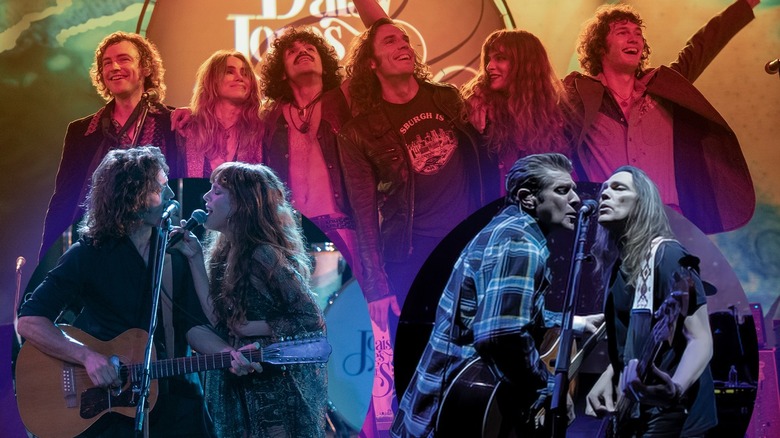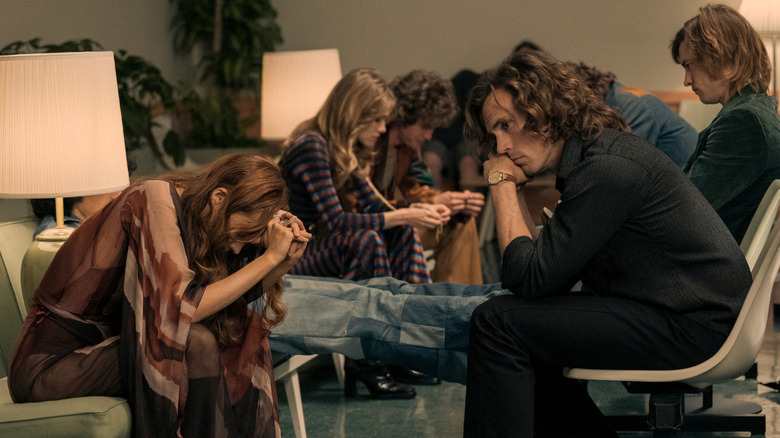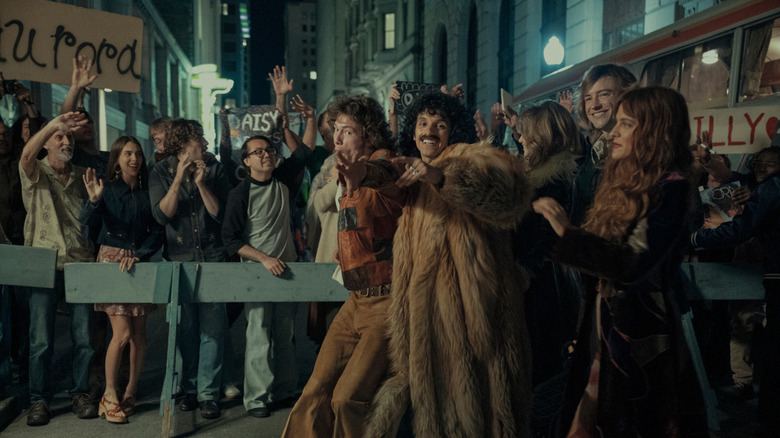Daisy Jones & The Six's Onstage Turmoil Mirrors Real Bands Like The Eagles
This piece contains spoilers for "Daisy Jones & The Six."
Viewers might feel a sense of familiarity watching Prime Video's "Daisy Jones & The Six" if you are a music fan. We have seen this narrative play out in both fiction and in real life — a band that starts off with passion fizzling out amongst themselves, becoming more infamous than actually famous. It seems from that the moment the titular band is truly formed, when music producer Teddy Price (Tom Wright) suggests that the soulful Daisy Jones (Riley Keough) joins the struggling Six, there was simmering drama ensuing.
Of course, that was always going to be the case. Thanks to inner-circle cheating scandals and conflicting views on where to take the band, the titular band's final show marked the explosive end to their story. For now, at least. That being said, the team behind "Daisy Jones & The Six" had plenty of real-life examples to base their dramatic climax on. While it is easy and correct to assume that British-American rock band Fleetwood Mac was the show's main inspiration, it takes specific cues from other bands, particularly soft-rock legends The Eagles.
That one fateful night
Much like Daisy Jones & The Six, The Eagles had quite the explosive and public break-up back in 1980 after reaching unprecedented success four years prior with "Hotel California." Dubbed the "Long Night at Wrong Beach," the show took place on July 31 in Long Beach, California, during a benefit concert for a senator running for re-election. However, the vibe was political for an entirely different reason, as a feud between frontman Glenn Frey and guitarist Don Felder reached a boiling point. According to Felder, Frey had booked the campaign concert knowing his bandmate's discomfort in using rock as a political tool. While at the concert, Felder gave the cold shoulder to the wife of the senator they were campaigning for. As he recalled in his memoir, "Heaven and Hell:"
"[Frey] found me in the dressing room and started yelling at me. I don't know if it was the drugs, or the fact that we'd been on tour for so long, but he just blew up. Just before we stepped onstage I turned to him and said: 'You know, Glenn, what you just did back there? You're an a**hole for doing that.' He replied: 'That's an honor, coming from you.'"
Once they actually got on stage, their relationship reached a point of no return. While not as dramatic as Daisy Jones & The Six's onstage breakup, it did involve a lot of on-stage bickering and name-calling, some of which ended up getting picked up on their microphones. However, things went to the extreme when Felder smashed one of his acoustic guitars out of frustration, setting the stage for the Eagles' first break-up.
Could've been something great
The parallels between the "Daisy Jones & The Six" climax and the real-life break-up between The Eagles aren't exactly subtle. The fact that they aren't actually helps the show ground itself in a way that it otherwise fails to do with its music, something I have previously taken issue with regarding the show. The '70s rock scene was all about sex, drugs, and rock 'n roll, a major hubris that the fictional band we've been following for the past month were no strangers to.
While their music and some of the show's larger aesthetic may not always match up to its '70s setting, it's ultimately the band's demeanor and attitude that brings audiences back down to Earth. Daisy and the rest of the troubled band don't sound like bands like The Eagles or Fleetwood Mac, but they act like them. They all have that carefree swagger that is so reminiscent of the time period, something that can only have been achieved through careful study of the era's biggest bands.


